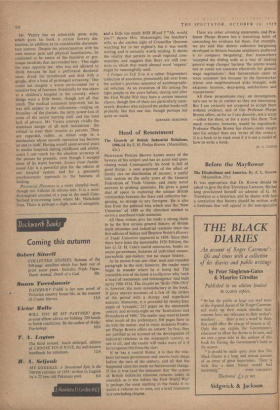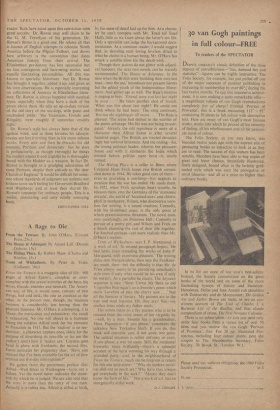Before the Mayflower
The Elizabethans and America. By A. L. Rowse. (Macmillan, 25s.) IT was appropriate that Dr. Rowse should be asked to give the first Trevelyan Lectures. He has long proclaimed himself an admirer of G. M. Trevelyan as a historian, and he shares with him a conviction that history should be written with a liveliness that will appeal to the non-specialist
reader. Both have acted upon this conviction with great success: Dr. Rowse may well claim to be the G. M. Trevelyan of his generation. Dr. Rowse's theme is a good one. He relates all that is known of English attempts to colonise North America before the Pilgrini Fathers, and shows how arbitrary is the convention that dates American history from their arrival. The Elizabethan pre-history has less successful but no less courageous and harrowing stories, and equally fascinating personalities. All this was known to specialist historians: but Dr. Rowse has brought it together, added it up, and given us his own observations. He is especially interesting on reflections of America in Elizabethan litera- ture. Dr. Rowse is always happiest with nautical types, especially when they have a dash of the pirate about them. He tells an up-to-date version of the old story of the sea-dogs, with gusto and unabashed pride: 'the Victorians, Froude and Kingsley, were roughly if somewhat crudely right.'
Dr. Rowse's style has always been that of the spoken word, and in these lectures his idiosyn- crasies are less irritAing than in his more solemn works. Every now and then he thwacks his old enemies, Puritans and democrats: but he does it perfunctorily, as though (wrongly) he thinks his readers expect it and (rightly) he is thoroughly bored with the bladder as a weapon. In fact Dr. Rowse is brought to a grudging admiration of some Puritans, despite their attitude to 'the dear Church of England.' It would be difficult for some- one whose standards of judgment are ,esthetic not to have some such feeling for Governors Bradford and Winthrop; and at least they shared Dr. Rowse's contempt for ordinary people. This is a useful, stimulating and only mildly annoying book.
CIIRISTOPIIER BILL







































 Previous page
Previous page